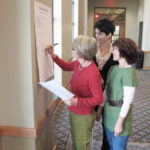By Corinne Winter
Who would have expected that during this season when many of us try to participate more frequently in Mass and in other prayers with our faith community, we would suddenly find those opportunities taken from us by a pandemic? Longing to know God is with us, we are kept away from key sources of that assurance. Longing for the support of community, we are told to separate. What do we do? Where does that leave us?

The church does not ask for a physical miracle to make church the one safe place to gather but prudently follows what human sciences can tell us; leaders also offer us guidance and support as they can. The Diocese of Davenport website contains a prayer for use at home on Sundays when we are unable to join the community for the Eucharist. After looking at that prayer, someone recently asked me about the idea of “Spiritual Communion.” What is it all about? In what ways is it like and different from the Communion we receive at Mass?
One way to avoid confusion would be to distinguish between the word “communion,” which can be used in more than one way; and the word Eucharist, which refers to the sacrament of the body and blood of Christ under the forms of bread and wine. The prayer for Spiritual Communion found on the diocesan website clearly states “since I cannot now receive you sacramentally…” So we do not view Spiritual Communion as a form of the sacrament.
The term Communion, which we use to refer to receiving the Eucharist, can be used in other important ways. To be in communion with someone or with a group is to be connected with that person or community on a deep personal level. When we receive the Eucharist, that connection is made sacramentally; Christ gives us his body and blood under the forms of bread and wine. We revere and long for the Eucharist as the source and summit of union with Christ and with the church.
We also believe in the all-powerful love of God who gives us the sacraments as signs and means of grace. We, as a human community, are bound by those sacraments. We do not try to achieve their ends by other means. God is not so bound. God can overcome barriers that humans and human life present. Thus, when the sacraments are not available, God can and does continue to draw us into God’s own life. When we pray for spiritual communion, that is what we are asking God to do. That is the gift we are opening our hearts to receive. That is the faith we express.
Praying at home, watching Mass on television or on the internet will never satisfy our longing for the Eucharist. When we are able to gather again, I imagine there will be great rejoicing, even tears of joy. Perhaps out of this time of deprivation we will, with God’s help, find a new appreciation for the gifts of community, of liturgy and of sacrament. As Catholics, we reject the idea that God would send suffering in order for us to grow in faith and commitment, but we do believe that God is with us in our suffering to help us bring good out of it.
Through the Eucharist, we are united with Christ as members of his body and thus we are in communion with one another as well as with God. That is why we gather for the eucharistic liturgy. It is why, when Communion is taken to those who are ill or homebound, it is a sign not only of God’s presence and self-gift, but also of their ongoing connection with the community, of the community’s prayer and concern. And as we pray in our homes, we will miss the community as well as the consecrated bread and wine.
Thus, as we pray for God to come into our hearts and keep us united with God, we pray as well that by the power of the Holy Spirit, we remain connected to, in communion with, one another. A beautiful “Prayer for a Pandemic,” which is also on the diocesan website, ends, “During this time when we cannot physically wrap our arms around each other, let us yet find ways to be the loving embrace of God to our neighbors.”
(Corinne Winter is a professor-emerita of St. Ambrose University, Davenport.)











